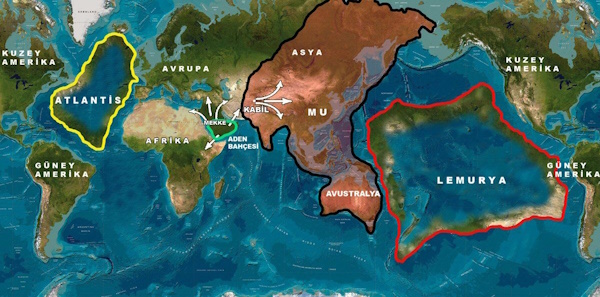Lemuria /lᵻˈmjuːriə/[1] is the name of a hypothetical “lost land” variously located in the Indian and Pacific Oceans. The concept’s 19th-century origins are from attempts to account for discontinuities in biogeography; however, the concept of Lemuria has been rendered obsolete by modern theories of plate tectonics. Although sunken continents do exist – like Zealandia in the Pacific as well as Mauritia[2] and the Kerguelen Plateau in the Indian Ocean – there is no known geological formation under the Indian or Pacific Oceans that corresponds to the hypothetical Lemuria.[3]
Though Lemuria is no longer considered a valid scientific hypothesis, it has been adopted by writers involved in the occult, as well as by some Tamil writers in India. Accounts of Lemuria differ, but all share a common belief that a continent existed in ancient times and sank beneath the ocean as a result of a geological, often cataclysmic, change, such as pole shift.
Atlantis (Ancient Greek: Ἀτλαντὶς νῆσος, “island of Atlas”) is a fictional island mentioned within an allegory on the hubris of nations in Plato’s works Timaeus and Critias, where it represents the antagonist naval power that besieges “Ancient Athens”, the pseudo-historic embodiment of Plato’s ideal state (see The Republic). In the story, Athens repels the Atlantean attack unlike any other nation of the (western) known world,[1] supposedly giving testament to the superiority of Plato’s concept of a state.[2][3] At the end of the story, Atlantis eventually falls out of favor with the gods and submerges into the Atlantic Ocean.
Despite its minor importance in Plato’s work, the Atlantis story has had a considerable impact on literature. The allegorical aspect of Atlantis was taken up in utopian works of several Renaissance writers, such as Francis Bacon’s New Atlantis and Thomas More’s Utopia.[4][5] On the other hand, 19th-century amateur scholars misinterpreted Plato’s account as historical tradition, most notably in Ignatius L. Donnelly’s Atlantis: The Antediluvian World. Plato’s vague indications of the time of the events—more than 9,000 years before his time[6]—and the alleged location of Atlantis—”beyond the Pillars of Hercules”—has led to much pseudoscientific speculation.[7] As a consequence, Atlantis has become a byword for any and all supposed advanced prehistoric lost civilizations and continues to inspire contemporary fiction, from comic books to films.
While present-day philologists and historians accept the story’s fictional character,[8] there is still debate on what served as its inspiration. The fact that Plato borrowed some of his allegories and metaphors—most notably the story of Gyges[9]—from older traditions has caused a number of scholars to investigate possible inspiration of Atlantis from Egyptian records of the Thera eruption, the Sea Peoples invasion, or the Trojan War.[10][11][12][13] Others have rejected this chain of tradition as implausible and insist that Plato designed the story from scratch,[14][15][16] drawing loose inspiration from contemporary events like the failed Athenian invasion of Sicily in 415–413 BC or the destruction of Helike in 373 BC.[17]





